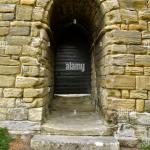This past weekend I was at a conference in Denver called “Theology Beer Camp.” If academics committed themselves more often to crafting such creative titles for their annual get-togethers, more people would want to go. Theology Beer Camp was a gathering of several hundred progressive/deconstructing theologians from across the country; as I’ve often said, although I’m not a theologian, I could play one on television. Several aspects of the conference were themed to Tolkien’s The Lord of the Rings trilogy; at the registration table attendees were asked to fill out an identification card on a lanyard that indicated (1) your name, (2) where you were from, and (3) your favorite Lord of the Rings character. Mine (obviously) was Treebeard.
The official name of the event was “The Return of the God-Pods”; the various sessions were hosted by different progressive theology podcast personalities who interviewed one or two important progressive theology figures (thirty podcasts were represented). Jeanne and I both listen to some of these podcasts regularly; she was the one who first identified this event and told me that she thought I should attend. The middle of October is the worst possible time for to attend an academic conference, given that I am swamped with grading and that the deadline for midterm grades is only a little over a week away. But I usually trust Jeanne’s intuitions, so I registered and off I went. I got to meet several people in person (Diana Butler Bass, Tom Oord, James McGrath, Pete Enns, Jared Byas) whose podcasts or books I have admired for years. Very cool.

In addition to the conference itself, a major reason to attend is that my younger son Justin lives and works in western Colorado, located on the other side of the Rockies just a four hour drive from Denver. He was able to get the days off and joined me for the festivities. In addition to attending two major sessions of the conference each day, Justin and I explored the south Denver area, finding an excellent restaurant called “2 Penguins” (really!) as well as Lone Tree brewery which we visited twice. By the way, although the idea of craft beer at the conference site was a draw, it turned out to be a bit of a bust–no dark beer available on either day. But I’ve never been one who considered myself morally bound to stay locked in at any conference, so finding a local brewery with beer more to our liking was as much of a spiritual experience as any of the sessions we attended.
The very first session we attended at the conference on Friday morning was a panel discussion called “The New Evangelicals” in which the two hosts of a podcast by the same name interviewed Diana Butler Bass and Brian McClaren, two of the older (they are a bit younger than me) rock stars of the progressive Christian movment. Both Brian McClaren
and Diana Butler Bass
have appeared over the past several weeks in essays on this blog, so it was great to hear them both in the flesh for the first time.
The session was brilliant–when and if recordings of the sessions from the conference are made available, this event will be the centerpiece of a new post. For today, I just want to relate a story Brian McLaren told that focused on what he described as an important turning point in his own development as a person of faith. At the time he was a thirty-something pastor of a large evangelical Christian church, experiencing not only the usual problems any leader of a faith community might encounter but also evolving, serious questions about his own faith journey.
Brian used to get one day per week off (probably Monday), a day that usually involved going out by himself into nature and doing a lot of complaining, often laced with profanity, both about his congregation and the God who presumably put him in this ministry in the first place. On this particular day, a familar verse from Proverbs 3 popped into his consciousness.
Trust in the Lord with all your heart, and lean not on your own understanding. In all your ways acknowledge him, and he will direct your path.
And McClaren had one of those “AHA!’ Big Bird moments that changed his life as he saw this well-worn text in a new way that focused his attention like a laser on the “lean not on your understanding” part. “It had never occurred to me,” McClaren said, “that who God might be and my own understanding of God had become the same thing.” In another session someone referred to human beings as “idol-making factories”; in this case, McClaren’s belief concerning who or what God is had become in his mind and faith identical to God itself.
What was the takeaway the Brian McClaren wanted to convey to the hundreds of people in that session? Here’s what he said, guaranteed to be accurate because I copied it from Justin’s notes that he wrote furiously as McClaren spoke:
Doubt your understanding of God and realize that there might be a God outside that understanding. Give yourself permission to not lean on your own understanding of God.
Have the courage, in other words, to imagine that you don’t have God figured out, to realize that insisting that your current understanding of God cannot be expanded or improved is idolatry, and to accept that (to quote a speaker from yet another session) “what we call “God” is usually just a louder version of “human” or even “me.”
Not bad for a Friday morning at Theology Beer Camp. More reports from the conference to come.













